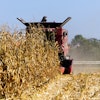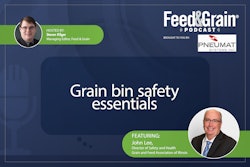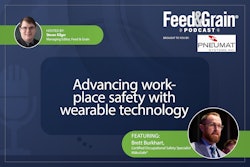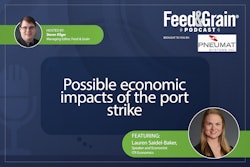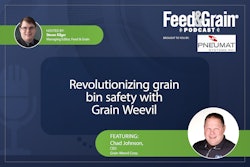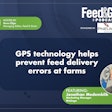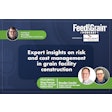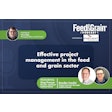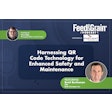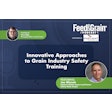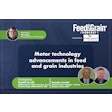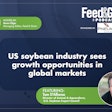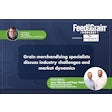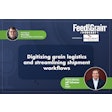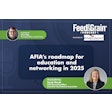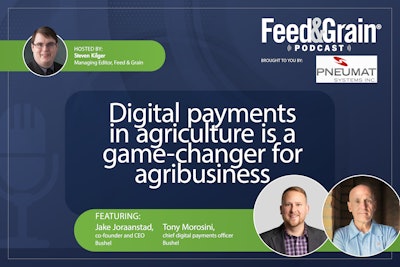
In this episode of the Feed & Grain Podcast, host Steven Kilger welcomes Tony Morosini, chief digital payments officer at Bushel, and Jake Joraanstad, co-founder and CEO of Bushel, to discuss the transformative potential of digital payments in the agriculture sector. With Tony's extensive background in digital payments and product development, the conversation delves into the challenges faced by agribusinesses in managing financial transactions, including the prevalence of paper checks and the need for more efficient payment solutions.
Jake and Tony share insights from their recently released report on digital payments in agriculture, highlighting the industry's slow adoption of technology and the innovative strategies Bushel is implementing to streamline payment processes. As they explore the future of payments in agriculture, the episode emphasizes the importance of leveraging technology to enhance cash flow, reduce friction in transactions, and ultimately benefit both farmers and agribusinesses alike. Join us as we uncover how digital payment solutions are set to revolutionize the way money moves in the agricultural landscape.
View on Zencastr
Steven Kilger - 00:00
Hello! My name is Steven Kilger, I’m the managing Editor for Feed & Grain Magazine and the host of the Feed Grain Podcast. Thank you so much for joining me today as we dive deep into the issues affecting the Feed Manufacturing, Grain Handling and allied industries.
Today’s episode is brought to you by The BinWhip from Pneumat Systems. The powerful Dual Impact BinWhip removes the toughest buildup and blockages in industrial storage silos – without hazardous silo entry. Learn more today at binwhip.com.
Today's podcast has two guests: Jake Joraanstad, co-founder and CEO at Bushel, and Tony Morosini, Bushel’s new chief digital payments officer. We’re talking about the advantages of implementing a digital payment system at your facility, how it addresses the security and other issues surrounding paper checks, and the uptick in digital payments in the industry.
I hope you enjoy the interview! If you want to help with the podcast and are listening to this in a podcasting app, please rate us and subscribe! If you’re listening online, sign up for the Feed & Grain Newsletter Industry Watch to see when new podcasts drop and stay up to date with all the news from around the industry.
Now onto the show.
Hi Jake! Hi Tony! Thank you guys, so much for joining me today, I really appreciate it. You're here because Tony, you were hired at Bushel not too long ago.
Would you mind telling us a little bit about your background in digital payments and what kind of drew you to the agriculture section?
Tony Morosini - 01:27
Yeah, sure, Steven. So my name is Tony Morsini. I'm the chief digital payments officer at Bushel. I've been here and I think August 5th was my first day at work. So, I'm like two and a half months in. I've spent about 20 years in payments. I used to own a consulting company, and I ended up getting Visa as a client and I went there, and I loved it, and I became an employee and I ended up at Visa for 10 years in product.
I was always in the product there working on different Visa product types like dispute products and commercial car issuer processing and kind of got the startup itch. I had a friend who had just started a company called SoFi and I was the original head of product and I stayed there for five years and I launched A pretty successful program there called SoFi Money, which is a large, basically a large challenger bank product.
I think today it has like 2 million customers on it. And so that was great because I then had network experience from Visa. Then I had an issuer experience being a real issuer, a card issuer at SoFi. And then I went to figure with a bunch of the ex-SoFi people, I stayed there a few years. I created an issuer processing platform built on blockchain. I stayed there for about four years, and we sold that business.
And then before I worked at Bushel, I was a cool merchant gateway provider for the oil and gas industry. This is where a lot of my ideas for Bushel kind of came from. It was a focused business out of Houston that provided merchants acquiring mobile transactions for the oil and gas industry. When I was working there, I met Jake and he and I talked about this for months and it got me excited about it. So I joined Bushel.
Kilger - 02:58
Well, number one, welcome to agriculture. We're happy to have you. Jake, well, you've been on before and we've talked before, but can you give us a little background?
Jake Joraanstad - 03:06
Yeah. Hey guys, Jake Joraanstad the co-founder and CEO here at Bushel. My co-founder Ryan Raguse and I have been building software specifically in agriculture since 2017 with our offering. I'm a technology guy with that background, but family on both sides of my world are in agriculture, both in cattle and in row crops up here.
I grew up in Northern North Dakota, about 10 miles from the Manitoba border.
Man, if Tony's background doesn't tell you that we're serious about solving these payment problems in AG, I don't know what is. And if you think we're crazy about titles, Chief Digital Payments Officer, it really is just that if you say it's CDPO, it just sounds like C3PO.
So that's why we went with that. So that's the whole reason for that title. But Tony knows what he's doing in this space. And frankly, the opportunity is massive to change how we think about money movement in agriculture. And it's starting to change, but there is a heck of a lot of work left.
Kilger - 03:59
You guys just released your report on the kind of digital payments in agriculture. What did you guys find out? 70% of grain settlements are still being paid by paper check?
Joraanstad - 04:08
At least.
Kilger - 04:09
As a millennial in a digital age, that's still kind of crazy. We're so far behind. Can you talk a little bit about what you guys are thinking are the solutions to that, whether it's BCH payments or digital wallets?
Joraanstad - 04:22
So first off I want to dispel some myths because, and I hope everyone who's listening kind of hears this, first off for some reason we still hear people think that we are somehow building some sort of crypto blockchain payments tool for AG, but that is not the case. We're working with traditional bank tools but moving agriculture into the 21st century of banking which includes ACH, and you know moving away from wires, moving away from drafts and paper checks. And the other myth is that this is all about real-time payments. And our customers, the agribusiness, whether they're a co-op, a grain elevator, or a retailer, they're worried about float. That makes sense.
It's not great to hear as a farmer, but the truth is that paper checks take seven days or more to get deposited and, in that time, somebody might be earning interest on that money while you as a farmer take too long to get it deposited. And so We aren't trying to necessarily break all these sorts of models, but at the same time the idea that a farmer would be inconvenienced every single week and month, especially during harvest, to have to go to town and deposit a paper check at the bank.
And on top of the fact that they may have a lien, which adds another complication to the problem, is ridiculous. And we went this fall and launched, basically, we call it direct deposit for our customers. So, this is a grain elevator that's paying farmers or a processor, an ethanol plant or mill that owes farmers and their businesses money for their grain, can enable this where the farmer just clicks the drop-down and gets set up with direct deposit all on the tool, on the mobile app or on the web.
Whereas traditionally, as you know, you've probably seen this before, you fill out a paper form, put a voided check in the mail, and you send all your account information in the mail to somebody. That's how you get set up today, prior to Bushel's work in direct deposit. The last time that I got a paper check for my payroll was like never. There's a lot of work to be done.
We're making it super easy for our customers to do that. But in the process, Steven, we have companies that we work with that don't even have an ACH processing ability, and have never offered ACH payments before. And that's only one part of the equation.
That's to pay the farmer, but getting paid electronically is also a challenge as a retailer for fertilizer, seed, chemicals, and whatever else. So, tons of problems. I think we're making progress and it's not some dark art, black magic we're working on here.
Morosini - 06:44
Steven like one of the things that's really interesting is I've worked with a ton of banks in like a partnership capacity over these past 20 years in payments and you know you watch advertisements for commercial bank accounts and things right there always there's always the communication in the marketing that hey we know your business. And that's how they pitch these commercial products we know your business we're here for you and I think at the banker level that's totally true I think the bankers you meet in any kind of commercial account set like for a farmer they do know your
business but does that really then manifest itself in the products and if you look at really the products that are offered while they have that knowledge on the people side when you look at the products are just these more or less. Relatively generic, like core banking and payment services they buy from just a couple of big companies that are largely all the same.
And so, when I, you asked me in the first part, like what really excited me about, I think one of the things that really excited me was like, I couldn't believe no one had done this already. But my experience working with banks a lot is you must get to a chunky-sized bank before they really have software engineers on staff. Like most banks, they're just buying these off-the-shelf products from a few companies and they don't really have software engineers until you get, I've worked with some like up around 5 billion in assets before you start to see that there's someone there who can deliver something that isn't just generic functionality.
So, I think that’s it. One of the opportunities I saw here was like here's a huge industry that gets really no love from banking tech and banking tech hasn't delivered anything to the banks that really solve this vertical's problems.
Kilger - 08:27
Yeah, that's a really good point that I really didn't think about because even if your local Farm Bureau bank person knows you really well and knows the industry, and who they work for, that's a giant conglomerate. It probably has really other pressing concerns and it's usually not agriculture.
Joraanstad - 08:43
And to introduce more problems, I mean, go try to digitally figure out where you stand on all of your loans in agriculture. All of us are used to seeing our credit card balances and our loan balances from our mortgages from our banks. But to understand that in one place as a farmer, As well as being able to somehow see your operating line from farm credit and maybe your loan from Farmer Mac for your land.
It's just not even possible right now. It takes you forever to understand and most of it's just a paper invoice. Here's your latest mortgage due and here's your balance.
And so that too has not been solved. And there's a ton of opportunity to work with the farm credit system and everyone else involved to kind of make this whole thing easier for everyone.
Kilger - 09:24
Yeah, and there's I mean finances are a struggle even at the best of times so making it as easy as possible to get your information and know what's happening with all your loans and accounts seems really important as a normal person who doesn't have a small business like I need that. There's kind of the question about security you hear about digital fraud and stuff because that's what everyone's doing but there are actually a lot of security concerns with mail payments and how can digital payments hopefully help ease some of those problems because sending checks to the mail is never the most secure way of doing things.
Morosini - 09:55
Checks are pretty insecure in general. At the bottom of the check is that routing number and account number, which is like a private key printed on a piece of paper is really what that is, right? It's not secure.
They do those polls for your gym membership. What that is, is that's the manager at the gym uploading a spreadsheet in their bank portal. A routing number and account numbers and they say, pull 50 bucks this month from Steven's account, pull 45 from Tony's account, and they upload that into their commercial banking application.
But that data is, you know, probably in a spreadsheet.
In these situations, you have someone learn a bunch of routing numbers and account numbers, they can pretty much add. Whatever they want to that the polls will go through, and they could take the money before anyone knows about it. And those kinds of things happen. That kind of fraud happens. There are people with bad intentions everywhere. And so the check is inherently insecure, honestly, because it's exposing a private key to the world, basically.
Joraanstad - 10:49
Steven, another problem, is the ag retailer if you're a grain elevator and an ag retailer as well. The idea of being able to take payment for a fertilizer purchase of $20,000 and it's on a credit card negates the entire point of selling the product because you're paying three, three, and a half percent on the transaction. It's not a feasible path forward in ag and so there needs to be another alternative method of payment besides the paper check and the credit card to make that happen.
Kilger - 11:14
That's a good point because a lot of this, you could look at it as kind of an advantage towards the farmer, right? Like digitizing payments, getting them their money faster, but it's also a big benefit to grain elevators, fertilizer plants, these businesses that having a check writing system isn't, I'm guessing isn't cheap. It's also. Hard to keep track of and also like you said if you do it through a credit card then you're open to fees. It just seems like there are a lot of problems for people at every level of this that digital payments could help solve.
Joraanstad - 11:46
If you assume that you have no fraud on an annual basis for paper checks, a paper check transaction costs between 10 and 25 dollars every time. That's before any other problems so clearly there's a better way.
Kilger - 12:00
Yeah and agriculture gets a lot of slack for being behind on technology and admittedly they are kind of slowed in the uptake with some things, but this seems like we're far behind. Agriculture is also kind of like this weird amalgamation of personal and business relationships all being intertwined and the guy that you know your banker and you've known him for 25 years and you've always gone through him you know your local grain elevator that even if the one down the street As flashy new stuff you tend to stick with the one you know. How can digital payments enhance and simplify these business interactions?
Joraanstad - 12:35
If you're from Silicon Valley you think that you could just jump into this space, disrupt everything and none of those things matter. But the reality is we have physical products. In this video, we are using digital payment methods or transactions online in agriculture. That is clearly the pattern that's happening.
Kilger - 13:15
And you guys, you've done that. I've noticed most of your interactions with it tend to be bringing businesses in, right? Bringing co-ops, bringing other software companies in on your system, and therefore being able to kind of branch out that way rather than targeting individual producers.
Joraanstad - 13:34
That's how we've come to market for the last five years. That continues to be our focus in terms of the customer, right? The agribusiness is our core customer. We're here to make their business more efficient and more effective. If in the end, it benefits the farmer as well, that's a double win for us. In ‘25, you're going to see some more capabilities. We're really on both sides, the agribusiness, but also you're going to see some things from us on the farmer.
That will make it make more sense for the farmer to encourage their agribusinesses to use these tools because their benefits are going to continue to go up and in the end, if you can make more interest on your cash sitting in your account today rather than a week from now or maybe never a lot of farmers for example don't get paid more than maybe half a point of interest on money sitting in their checking account we're going to change that ‘25. And I think that's going to matter a lot for these guys. Small margins right now are all we have to work with. And so if we can help them all make more money in the process, I think it's going to change the way people think about this.
Kilger - 14:28
Well, you mentioned earlier that a week for a check to be deposited is a week you're not getting interest. And yeah, that probably doesn't sound like a lot to a lot of people, but when you're getting hundreds of thousands of dollars in payments ...
Morosini - 14:41
A week's two percent of a year, right? And so you have a lot of those two percent a year all adds up, right?
Kilger - 14:43
But it is getting better. Your State of the Farm report showed that 12% in paper check payments. Do you see that as a trend? Do you think it's going to snowball I think a big question because to me it seems like a perfect opportunity for in five years for us to be almost at Well, our job is to make it snowball.
Joraanstad - 15:01
That's our top priority at Bushel. And then, you know, what else is crazy is our, the volume, even our own system, we're seeing basically a 300% increase this year and money moved on the platform over last. And so we're starting to really see that is starting to snowball. What's interesting about the information is when somebody starts to do it this way, they don't really go back.
It's not like Oh it was an inconvenience and then they just went back to paper checks it was just easier. That is not what's happening and so once somebody's there I don't think they're going back to that old method and a paper check or whatever it might be and so I think no ball effects coming it's going to be rolling downhill and it's going to be rolling fast.
Morosini - 15:38
I think Steven, like you mentioned, this has been a long time coming. It's kind of, I think like it goes back to our original conversation. I don't think anyone's made the product for the industry. No one's focused on this.
When you start delivering a product that solves problems within a vertical industry in payments, like for example, When you make a payment method can either be your cash balance or your line of credit and it's a one-click difference and you make spending that money super easy as opposed to having a checkbook in the mail for that line of credit. You have to go find it in your desk drawer and all that when it's really all integrated in.
So the farm credit system lender's line of credit looks just like another bucket of money that you can pull from in one button or when you have a bill pay system but it's a bill pay system that is pre-populated with Common, ag industry, payees, all these little features just incrementally make it more and more powerful. Every one of them solves another problem and reduces friction. And so that's what we're going to roll out is that, right? And I think it will snowball. I mean, that's what we're betting on, and people will see the value. So, people have got to see the value in your product, right?
It's got to solve their problems. It's got to have better economics. It's got to overcome the friction of changing. And so to do that, it has to be a lot better than what they have today. That's what we're going to Yeah, definitely.
Kilger - 16:59
And I mean, as more co-ops and companies also adopt your system, it is a selling point.
We talked a little bit about how people have loyalty, but loyalty only goes so far. And if a co-op can demonstrate that it is making this easier for the producer compared to its neighbor, then yeah, it probably will attract some customers over.
Joraanstad - 17:19
We know it does, Steven. The customers are saying I work with this company because they pay me online and they pay me on time. And that's why I've switched to doing business with them. Because if they're in the same market, there's not necessarily a difference in price, unless there may be a process or something like that. We're seeing that already.
Kilger - 17:38
I would imagine, because it is, I mean, at the end of the day, this is business, and the easier you can make it for your customer, then the better. It's not complicated.
Joraanstad - 17:46
Here's one thing that's interesting in ag. Our customer at Bushel has explained to us so many times that part of their challenge is this lien position that a lender may have with the farmer and they're liable to some extent to pay the farmer correctly, especially if there's a lien. They may have to have two names on the paper check, one the lender and one the farmer, and their job is to check the state registries and everywhere else to make sure that the farmer doesn't have loans they're not aware of. That's a problem we've been working on for a while.
We've realized now about somewhere between 30 and 50 percent of the industry payments would have a lien on them at any given time. So that means there has not been an electronic payment solution for liens and so we have been working hard on this. We filed our first patent this year. On top of the idea of us filing the patent, in the process, we found that nobody has filed patents in this arena, and frankly, nobody has even thought about this problem before. And so, of course, to Tony's point, nobody has done this before.
Kilger - 18:49
That is exciting, and you do have some exciting stuff coming up, can you give us a little preview? And you're going to have to come back on once these systems launch to a broader audience.
Joraanstad - 19:00
The first major change for us in 2025, we'll talk about this more in January, but our customers are going to start earning interest on all their money in our accounts with our bank partner. They're not Bushel, right? It's not a Bushel account. It's FDIC insured bank account. They'll be able to have significantly higher FDIC insurance limits and they'll be paid really competitive rates on their interest on a liquid checking account. It's not a money market. It's not a CD tying your money up for six months.
It is liquid. And so that's a big change. And then you'll see in Q2 next year, a lot of updates coming for the farmer to make their reasons to use a tool like this significantly higher. Tony, do you want to share any more?
Morosini - 19:38
We really looked at making the farmer switch from a paper check-based world. What do we have to have? So, we put together a roadmap of features that'll be coming out next year. And like Jake said, the first thing will be higher limits, higher interest rates than we think they're going to get anywhere else.
We're going to do things like we've heard that the problem with mobile check deposits has been the limit, like their local bank, if they do have it, then they've got some tiny limit of $10,000 or something. And that doesn't work in the space where they were getting big checks of a hundred thousand dollars. So, we're going to address that.
We're going to have a debit card on the product. They'll be able to either spend their cash balance with us, or they'll be able to hit a third-party line of credit. And we're building that as well. And so a bunch of. Features, like I mentioned earlier, a bill pay that's ag-centric. We think this is going to be a compelling product financially that was really built for the American farmer, honestly.
Kilger - 20:34
Well, yeah, it sounds like it's going to be an exciting 2025. Tony, is there anything that's kind of surprised you about just working in ag in the payments landscape?
Morosini - 20:45
Honestly, no. Jake and I talked for a couple of months before I joined and so I did my research The lack of anything very compelling from a product standpoint, and the lack of any one major bank really dominating in this space, are all things I kind of figured out on my own and it just sort of reinforced. You know, my belief that there was a huge opportunity here.
There are a couple of businesses that have sort of done this, that have focused payments on a vertical and have done extremely well. One of them is, you know, WEX and Fleetcore, those two, which focused on truck drivers. Over-the-road truckers, 18-wheeler drivers and developed payment networks at those fuel stations that those big gas stations that truckers go to, they focused on a payment network for that and then expanded into other services for that industry like factoring and currency exchange for truckers that drive across borders a lot like in South America and Europe.
Morosini - 21:44
And so, as I looked at this, I was like, this really reminds me of those other businesses yet. This one, no one has touched this yet, really at all. That was pretty exciting. And like I said, Steve, I came into this with my eyes pretty wide open.
Kilger - 21:59
That doesn't surprise me. You are in finance, not in English. With me, I'd be taking the job. No research was done. It's fine. I'll figure it out. You probably did all your research. Thank you guys so much for joining me today. I really appreciate it. I hope you come back soon and I hope that you have a great rest of your year.
Joraanstad - 22:15
I hope everybody that's working hard to finish out harvest this year, whether you're buying grain or a farmer yourself, good luck finishing harvest in 2024.
Kilger - 22:30
All right, thank you guys and to everyone out there listening, stay safe.
.jpg?auto=format%2Ccompress&crop=faces&fit=crop&h=48&q=70&w=48)

